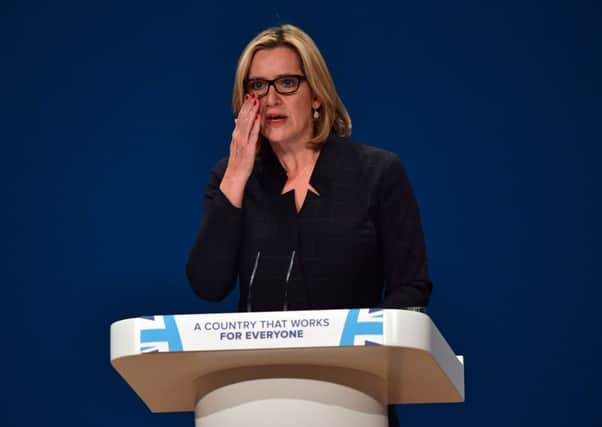Dani Garavelli: Time to sneer or stand up and be counted?


Yet even the most percipient of observers would have been hard-pushed to predict that, within days, “foreign” doctors would be told they could stay in the UK only until we’d trained our own. Or that companies would face the prospect of drawing up lists of “foreign” workers to prove they weren’t employing too many. Or that international students would be the targets of a new crackdown.
Before the Conservative party conference, the racist rhetoric of the EU referendum had been largely confined to Leave campaigners. Fuelled by Nigel Farage’s Breaking Point poster, it had found expression on the streets in the form of graffiti and attacks on Polish people. But the speeches of Theresa May and Amber Rudd transformed it from the rabble-rousing of extremists to official Tory policy.
Advertisement
Hide AdAdvertisement
Hide AdTogether, the Prime Minister and Home Secretary presented a vision of a future in which the state would bear down, not only on immigrants themselves, but on all those – landlords, employers, universities – who might give them succour. They did so in the certain knowledge it would have a negative impact on social cohesion, the smooth running of services and the economy.
What kind of a politician would wilfully embark on such a destructive journey? The kind who prefers a populist appeal to chauvinism to the grind of effective governance; the kind who can say: “I want us to be a country where it doesn’t matter where you were born, who your parents are, where you went to school,” while simultaneously conspiring to send non-Britons “home”.
It was the LBC talk show host James O’Brien who pointed out that the distinction between those “who are members of the nation” and those who are merely “domiciled in the state” comes straight from Mein Kampf.
Some right-wingers dismiss comparisons with Nazism as liberal hysteria. But fascism doesn’t start with yellow stars and death camps; it starts with a subtle process of dehumanisation.
Over the past few years we have seen derogatory language used to stigmatise an expanding circle of “outsiders”: first asylum-seekers, then unskilled EU migrant workers and finally “elite” groups, such as students and doctors.
Through repetition, untruths – such as “migrants milk our benefits system” or “migrants swamp our schools” – have become accepted wisdom. Now, the sinister prospect of the foreign workers lists looms large and a YouGov poll suggests 59 per cent of the population approve. So tell me: how long do the rest of us have to wait before we’re allowed to panic?
Perhaps it is the fear of over-reacting that has prevented some politicians from voicing their disgust, but I doubt it. Ruth Davidson dismissed the “foreign workers list” policy as merely “a consultation”, but she was happy to play court jester as warm-up act for the Prime Minister. Angling for a shot on Strictly Come Dancing, she seems overly preoccupied with her own profile to have a moderating effect on May’s excesses.
Labour is too consumed with its internal problems to present a united front against the Prime Minister. Before Jeremy Corbyn had a chance to accuse Rudd of “fanning the flames of xenophobia”, the Labour Party published a tweet in which it accused the Tories of not doing enough to live up to its promises on immigration.
Advertisement
Hide AdAdvertisement
Hide AdThe lack of any effective opposition has left space for Nicola Sturgeon to dominate. As she denounced the Tories’ “toxic rhetoric”, footage of the speech she gave at the formal opening of the Scottish Parliament in July began to circulate online. Back then, she set out her vision of our country as the amalgamation of all who live in it, regardless of birthplace. Her words inspired the hashtag #wearescotland in which ordinary people celebrated the hotchpotch of identities that make up our whole.
If you are cynical, you can mock this. You can say Rudd’s announcements were grist to the indyref 2 mill; that the First Minister’s crusading stance is merely a means to an end. Then, you can rail against the notion of Scottish “exceptionalism”; and point out that one million Scots voted Leave and that the YouGov poll suggests 46 per cent of SNP voters back the list.
But while you are dismissing other people’s “virtue signalling”, ask yourself this: what are you doing in the face of Tory hate-mongering? If the answer is “taking pot-shots at those who choose to believe in a better Scotland in the hopes they can will it into existence”, or “rifling through the archives to find evidence of Sturgeon’s double standards”, then perhaps you’re part of the problem.
As for me, I no longer care if the First Minister makes political hay out of her defence of immigration; or if she exploits it to “prove” the SNP’s nationalism is different to the nasty nationalisms of the past. I’m just relieved she is prepared to stand firm against the ill-will engulfing the UK.
There is no Scottish gene that makes us resistant to racism; but if stigmatising immigrants normalises bigotry, then political endorsement of heterogeneity ought to have the opposite effect. The lack of xenophobic language from Scottish political leaders during the EU referendum has already made a tangible difference. Long may it last.
While Sturgeon insists “diversity is strength”, May told her party: “If you believe you are a citizen of the world, you aren’t a citizen of anywhere.” Imagine a vision so insular, you’d choose that as your mantra. “Change is coming,” warned the Prime Minister, like a latter-day Nostradamus. It’s up to us to ensure it doesn’t take us to a dark place of no return.